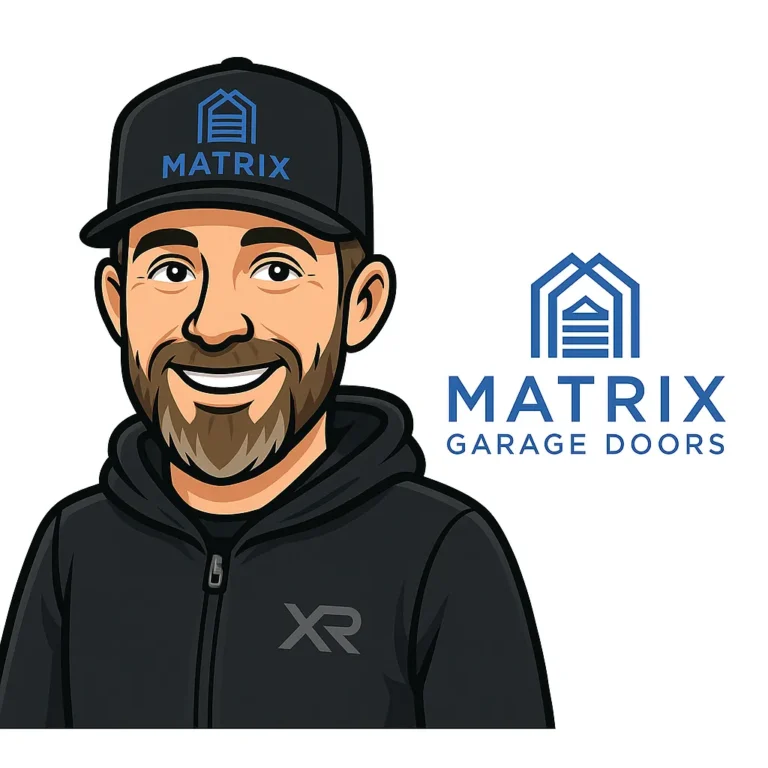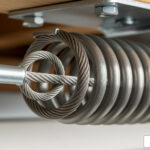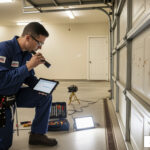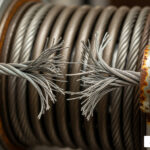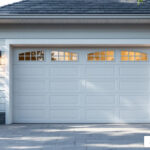
Key takeaways
- A squeaky garage door usually points to dry rollers, loose hardware, or a noisy garage door opener. Start with targeted garage door lubrication and a quick hardware check.
- Keep lubricant off the tracks. Focus on hinge pins, garage door rollers, and the opener chain or belt.
- If you see frayed cables, a gap in a spring, a crooked door, or noise that returns fast, call a garage door technician.
- A simple 10 minute routine solves most squeaks. Regular garage door maintenance twice a year prevents them from coming back.
- In the greater Columbus area, Matrix Garage Doors handles garage door repair, opener service, and full garage door tune-ups.
Introduction
Let’s be honest. A squeaky garage door feels small until it wakes the house, spooks the dog, and lets the whole block know you just got home. The noise is not a mystery. Metal parts are rubbing dry or working loose. The good news is many fixes are simple, safe, and cheap. In this guide I will show you how to shut down the squeak with smart garage door lubrication, a quick hardware check, and a few upgrades that actually matter. I will also tell you when to stop and call a professional, because springs and cables are not a DIY badge of honor. Think clear steps, real results, and a quiet garage that does not broadcast your schedule to your neighbors, so your neighbors stop giving you that look.
Why your garage door is squeaking

A garage door is a small factory that lives over your bumper. Hinges pivot, rollers spin, bearings carry weight, and the garage door opener lifts the whole show several times a day. When one part dries out or loosens, you hear it.
Common causes include:
- Dry garage door rollers that chatter on the track
- Loose hinge bolts or track brackets that click and clunk
- Dust or grit in the tracks that makes the rollers stutter
- A chain or belt on the garage door opener that needs light lube or correct tension
- An unbalanced door that loads parts unevenly and wears them out
Each sound tells you something. A high squeak usually points to rollers or hinge pins. A steady clunk hints at loose hardware. A metallic scrape can mean a serious alignment or bearing problem. Track the location and timing of the noise during the open and close. That simple habit makes troubleshooting faster.
Safety first
Before you touch anything, close the door and unplug the garage door opener. Keep your hands away from torsion springs, lift cables, and the center shaft. Those parts store dangerous energy. Homeowners can tighten visible hardware, wipe tracks, and lubricate hinges and roller bearings. Anything involving springs, cables, or balance belongs to a trained garage door technician.
Have this ready:
- Silicone spray or white lithium spray labeled for garage doors
- A socket wrench set
- A clean rag and a step stool or ladder
- Safety glasses
The 10 minute quiet-down
This quick routine fixes most squeaky garage door problems, ensuring a clean baseline for your garage door investment.
- Tighten hardware Snug hinge bolts and track bracket screws with a socket wrench. Do not over-torque. Loose hardware adds noise and can push the door out of alignment.
- Clean the travel path Wipe the inside of the tracks and the rollers with a dry cloth. Remove dust and cobwebs. Clean tracks help rollers glide. Greasy tracks collect grit and make more noise.
- Lubricate the right spots Use silicone or white lithium spray for garage door lubrication. Apply a small burst to hinge pins, roller bearings, and the opener chain or belt if your model allows it. If you have nylon rollers, aim at the bearing where the stem meets the wheel. Wipe extra lube so it does not drip and attract dust.
- Cycle and listen Plug the opener back in. Open and close once. If most of the squeak is gone, great. If one corner still complains, you may have a worn hinge or roller that needs replacement.
What not to do

- Do not lubricate the tracks. Keep them clean and dry.
- Do not touch torsion springs, cables, or set screws. That work is for a garage door professional.
- Do not flood parts with spray. Too much lubricant traps dirt and brings the squeak back.
- Do not bend panels or force alignment without training.
When to call a pro
Here is the line between smart DIY and smart self-preservation. Call Matrix Garage Doors if you notice any of the following:
- Grinding, banging, or a burning smell
- A crooked door, shaking travel, or frequent reversals
- Frayed lift cables or a visible gap in a torsion spring
- The squeaky garage door returns within days after correct lubrication
- The door fails a balance check or will not stay halfway when disconnected
These red flags point to spring fatigue, bent hinges, failing bearings, or alignment problems. A professional garage door tune-up includes balance testing, part replacement, alignment corrections, and opener adjustments that bring the system back to smooth and safe.
If the opener is the loud one
Sometimes the door is innocent and the garage door opener is doing the shouting. A dry chain, loose mounting bolts, or vibration transfer through the ceiling can turn a small noise into a performance.
Try this homeowner-safe plan:
- Tighten the opener mounting bolts and the header bracket
- Check chain or belt tension per the manufacturer guide
- Lightly lube the chain if your model allows it
- Add a thin rubber or cork pad between the opener bracket and the mounting surface to cut vibration
If the garage door opener chain or belt is damaged or frayed, stop using the door and call a professional garage door technician immediately. Replacing a stretched belt, worn sprocket, or damaged chain is not a DIY win. It is a safety job that needs the right tools and training.
Replace worn parts for a lasting fix

If proper garage door lubrication and tightening did not solve it, parts may be past their prime.
- Rollers: Nylon rollers with sealed bearings are a strong upgrade over old steel wheels. They cut noise and reduce vibration.
- Hinges: Bent or cracked hinges will squeak no matter how much you spray. Replace them before they fail.
- Opener: If a chain drive sits under a bedroom, a belt-drive opener with soft start can transform daily noise and improve overall feel.
These upgrades reduce friction, lower strain on the system, and keep your garage door repair costs predictable.
A simple seasonal maintenance plan
Treat your door like a daily-use appliance. A little routine care goes a long way.
- Monthly: Quick look at rollers and hinges. Wipe dust from tracks. Run one open and close to listen for changes.
- Every 6 months: Tighten visible hardware. Perform targeted garage door lubrication on hinge pins, roller bearings, and the opener drive.
- Yearly: Schedule a professional garage door tune-up and balance check. Ask for an opener inspection while you are at it.
Homeowners who follow this plan enjoy a quieter garage, fewer surprises, and longer part life. In the greater Columbus area, Matrix Garage Doors can set up a maintenance rhythm that fits your use and your home.
Conclusion

A quiet garage door is not about luck. It is about clean tracks, tight hardware, the right garage door lubricant in the right places, and knowing when to call a pro. Start with the 10 minute quiet-down. If noise returns fast, if the door looks crooked, or if you see any damage, stop and schedule service. A trained garage door technician will restore balance, replace worn parts, and dial in the garage door opener so everything works together. If you want it handled for you, Matrix Garage Doors serves the greater Columbus area with fast garage door repair, opener service, and full garage door maintenance. Fix the squeak today and enjoy a calmer home tomorrow.
FAQ

What products should I use for a squeaky garage door? Use silicone spray or white lithium made specifically for garage doors. These lubricants protect bearings without attracting heavy dust. Avoid general penetrating oils that strip existing lube and leave parts dry.
Should I lubricate the tracks? No. Keep tracks clean and dry. Lubricate hinge pins, roller bearings, and the garage door opener chain or belt if your model allows it.
How often should I schedule garage door maintenance? Every six months works for most homes. A quick monthly inspection is advisable if your garage is a main entry. A yearly professional garage door tune-up is a smart investment.
When is a squeak a safety issue? If you hear grinding or repeating clunks, or you see frayed cables, a spring gap, or a crooked door, stop using the system and call a garage door professional.
Will new rollers make my garage door quieter? Yes. Nylon rollers with sealed bearings can reduce noise and ensure smooth travel. They are one of the best upgrades after correct lubrication.
Can I fix a noisy garage door opener myself? You can tighten mounting hardware, check tension, and add light chain lube if the manual allows it. If the opener chain or belt is damaged or frayed, call a professional garage door technician immediately.
Does Ohio weather affect squeaks? Yes. Humidity and temperature swings, especially in the greater Columbus area, can thin or thicken lubricant and increase friction. Seasonal garage door maintenance keeps performance consistent.
